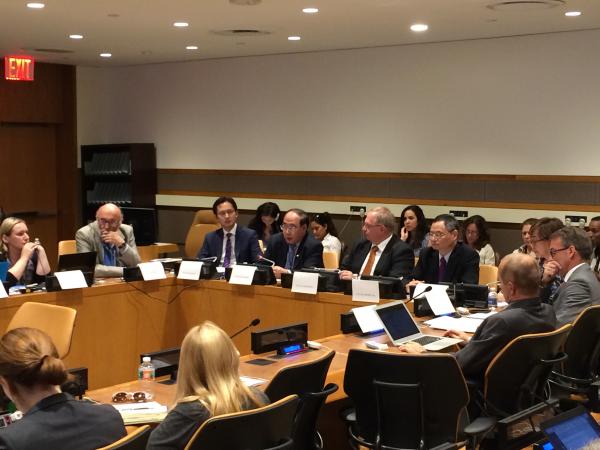On 20 July, 2015,Hungary, in cooperation with Viet-Nam and the Asia-Europe Foundation (ASEF), organized a full-room side-event on the margins of the Post-2015 intergovernmental negotiations. Participants reviewed national perspectives on implementation frameworks based on individual country experiences, as well as entered into a dynamic discussion on the role of, and challenges related to, data gathering and statistics.

H.E. Zhang Yan, Executive Director, ASEF introduced the work of The Asia Europe Foundation in the field of sustainable development, in the spirit of working across the traditional North-South Divide.
In his opening remarks H.E. Dr. Zsolt Hetesy, Deputy Permanent Representative, emphasized that national implementation of the Agenda will require a true paradigm change. The agenda is not only transformative, but also universal, as it speaks to 193 countries. More importantly, implementation will involve not only governments, but all stakeholders, governments, financing institutions, the private sector, volunteers, NGOs, etc. Therefore, all countries will have to undergo a ‘fit for purpose’ exercise with regard to decision making, implementation, review and monitoring. He then spoke on the role of indicators, statistics and reliable data for the Agenda (please see our previous post on the initiative for a resolution on World Statistics Day). The role of data and statistics is not limited to the monitoring the SDGs, but includes facilitating decision-making and mobilization.
In his Keynote Speech UN Under-Secretary-General for Economic and Social Affairs, H.E. WU Hongbo, highlighted the role of Hungary in the Open Working Group and in the field of Statistics. He underscored the importance of review, monitoring and data, while also emphasized the need for national governments to use “whole-of-government” approach and leave behind the silo thinking. “Delivering a one” must be true for the UN and the member states, alike.
Through the case studies of Poland and Viet Nam it was highlighted that despite different socio-economic systems, Countries will have to use similar strategies to deliver on the agenda.
During a lively discussion on data collection and statistics, it was underlined that in order to effectively monitor the progress made, new sets of data, statistics and indicators, new types of policies and also new techniques for reporting and monitoring are needed.
For media coverage of the event, please see below:
International Institute for Sustainable Development
Asia-Europe Foundation

